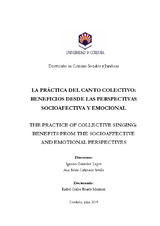Mostrar el registro sencillo del ítem
La práctica del canto colectivo: beneficios desde las perspectivas socioafectiva y emocional
| dc.contributor.advisor | González López, Ignacio | |
| dc.contributor.advisor | Cañizares Sevilla, Ana Belén | |
| dc.contributor.author | Benito Martínez, Rafael Carlos | |
| dc.date.accessioned | 2019-10-16T07:34:33Z | |
| dc.date.available | 2019-10-16T07:34:33Z | |
| dc.date.issued | 2019 | |
| dc.identifier.uri | http://hdl.handle.net/10396/19035 | |
| dc.description.abstract | El canto es considerado un elemento dinamizador del proceso evolutivo. Su valor transversal trasciende los aspectos específicamente musicales, implicando la práctica de actos beneficiosos para el ser humano y favoreciendo su salud. Las agrupaciones corales constituyen un espacio idóneo en el que cada componente aspira a lograr su superación, excelencia y felicidad contribuyendo al fin último de cantar. La presente investigación, basada en un diseño mixto no experimental, descriptivo y correlacional con modalidad transeccional, centra su interés en comprobar que la práctica del canto colectivo aporta al ser humano beneficios en las perspectivas socioafectiva y emocional. Los cinco capítulos en que se estructura el trabajo, recogen la fundamentación teórica del tema abordado, los rasgos descriptivos del estudio empírico efectuado, la sucesión de los resultados obtenidos y las conclusiones más significativas. Desde la consideración de las distintas dimensiones de estudio establecidas, y con independencia de su edad, sexo y agrupación coral de pertenencia, se observa como la práctica del canto colectivo impacta positivamente sobre el desarrollo socioafectivo y emocional del coralista. | es_ES |
| dc.description.abstract | Singing is considered a dynamic element of the evolutionary process. Its transversal value transcends specifically musical aspects, involving the practice of acts beneficial to humans and promoting their health. Choral groups constitute an ideal space in which each component aims to achieve its overcoming, excellence and happiness contributing to the ultimate goal of singing. This research, based on a mixed non-experimental, descriptive and correlational design with a transectional modality, focuses its interest in verifying that the practice of collective singing brings benefits to the human being in socio-emotional and emotional perspectives. The five chapters in which the work is structured, include the theoretical foundation of the subject addressed, the descriptive features of the empirical study carried out, the succession of the results obtained and the most significant conclusions. From the consideration of the different dimensions of study established, and regardless of their age, sex and coral group membership, it is observed how the practice of collective singing positively impacts the socioaffective and emotional development of the coralist. | es_ES |
| dc.format.mimetype | application/pdf | es_ES |
| dc.language.iso | spa | es_ES |
| dc.publisher | Universidad de Córdoba, UCOPress | es_ES |
| dc.rights | https://creativecommons.org/licenses/by-nc-nd/4.0/ | es_ES |
| dc.subject | Música coral | es_ES |
| dc.subject | Coros | es_ES |
| dc.subject | Canto coral | es_ES |
| dc.subject | Canto colectivo | es_ES |
| dc.subject | Agrupaciones corales | es_ES |
| dc.subject | Desarrollo socioafectivo | es_ES |
| dc.subject | Desarrollo emocional | es_ES |
| dc.title | La práctica del canto colectivo: beneficios desde las perspectivas socioafectiva y emocional | es_ES |
| dc.title.alternative | The practice of collective singing: benefits from the socioaffective and emotional perspectives | es_ES |
| dc.type | info:eu-repo/semantics/doctoralThesis | es_ES |
| dc.rights.accessRights | info:eu-repo/semantics/openAccess | es_ES |

